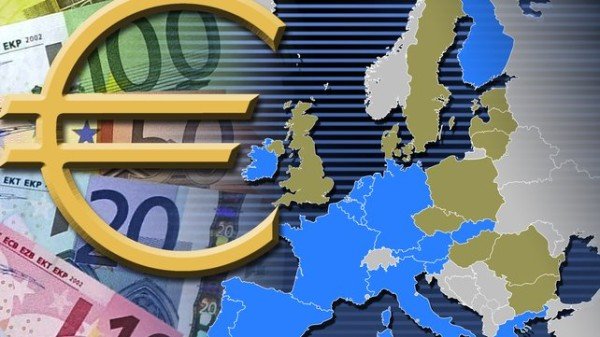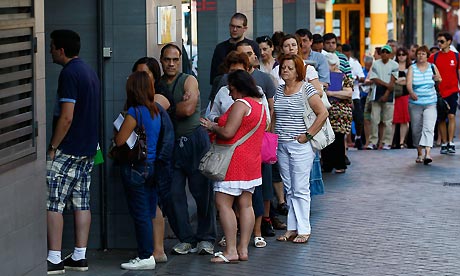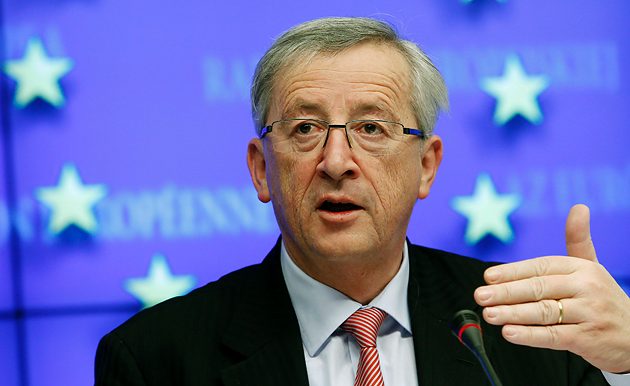The eurozone economy expanded by 1.5% in 2015, the statistics agency Eurostat has announced.
In Q4 of 2015, the 19 countries that use the euro grew 0.3%, compared with the previous three months, Eurostat has said.
The 28 countries of the EU also grew 0.3% in Q4, to a GDP growth rate of 1.8% for the full year.
Growth slowed during 2015, suggesting that more action may be needed to stimulate economies from the European Central Bank (ECB).
Eurostat also announced on February 12 that industrial production had fallen 1% in December compared with the previous month, both for the eurozone and the EU.
Year on year, it fell 1.3% in the eurozone and 0.8% in the EU.
The biggest contraction in GDP came in Greece, where the economy shrank 0.6% in Q4 of 2015, which was better than had been expected.
However, the contraction in Q3 turned out to have been bigger than previously thought, being revised from 0.9% to 1.4%.
Germany’s economy expanded by 0.3% in Q4 of 2015 to an annual rate of 1.7%.
The German statistics agency said that government spending was “markedly up”, while household consumption rose slightly.
The figures follow surprisingly poor industrial production data for December 2015.
Eurozone unemployment fell in July 2015 to its lowest rate in more than three years, Eurostat figures have shown.
According to the EU statistics agency, the unemployment rate in the currency union fell to 10.9% in July from 11.1% the month before.
The fall was helped by a sharp fall in Italy’s unemployment, where the jobless total fell by 143,000.
It is the first time the unemployment rate in the eurozone has been below 11% since February 2012.
The wider 28-member EU saw the unemployment rate fall to 9.5%, the lowest rate since June 2011.
The lowest unemployment rate was in Germany, at 4.7%. Greece had the highest unemployment rate, at 25%, the latest available data from May showed, followed by Spain at 22.2%.
The rate of youth unemployment across the eurozone also declined to 21.9% in July from 22.3% a month earlier.
A survey released earlier on September 1 suggested that growth in the eurozone’s manufacturing sector had eased slightly in August, despite factories barely raising prices.
The closely-watched Markit eurozone manufacturing purchasing managers’ index (PMI) was 52.3 last month, below a preliminary reading that suggested it had held steady at July’s reading of 52.4. However, it has remained above the 50 mark that separates growth from contraction for more than two years.
There was some good news within the data. Germany, the Netherlands, Ireland and Italy all saw strong growth, with Germany’s manufacturing PMI reading jumping to 53.3 in August from 51.8 a month earlier.
The manufacturing figures come almost six months into the European Central Bank’s (ECB) €60 billion-a-month bond-buying program designed to inject new life into the eurozone economy and combat low inflation, which is currently sitting at 0.2%.
With inflation still far from the ECB’s target rate of just below 2%, and looking likely to stay there for the foreseeable future, speculation is growing the bank will have to extend its stimulus program beyond the planned completion in September 2016.
Jean-Claude Juncker, the newly appointed European Commission president, has revealed details of a €315 billion ($393 billion) investment plan to kick-start Europe’s economy.
At the heart of Jean-Claude Juncker’s 5-year agenda is a new €21 billion fund, which would be used as “seed money”, to entice private backers to “pitch in” most of the rest.
Only €8 billion of the original money would come from the EU budget itself.
The project would take the burden off national governments, already facing big debts after the financial crisis.
Critics have already suggested that the scheme is too small, and needs far more hard cash if it is to make a major difference.
However, Jean-Claude Juncker said Europe had to face “the challenge of a generation” head-on, without a money-printing machine, describing his plan as the greatest effort in recent EU history to trigger additional investment without changing the rules.
Illustrating the type of projects he had in mind, Jean-Claude Juncker said he had a vision of:
- Schoolchildren walking into a brand new classroom equipped with computers in the Greek city of Thessaloniki
- European hospitals saving lives with state of the art medical equipment
- French commuters charging electric cars on motorways in the same way as petrol stations were used now
- Households and companies becoming more energy efficient
The Commission and the European Investment Bank (EIB) would create the fund’s €21 billion reserve, according to Jean-Claude Juncker, which would then enable the EIB to fund loans worth €63 billion. Private investors would be expected to put forward the lion’s share of the money, some €252 billion.
Jean-Claude Juncker’s speech came a day after Pope Francis addressed the same parliament, criticizing an “elderly and haggard” Europe that had become less and less protagonist.
Initial reaction to Jean-Claude Juncker’s plan came from Chancellor Angela Merkel, who told the German parliament that her government supported the package in principle, but it had to be clear to everyone where the projects were in the future.
The Commission president, who came to office at the start of November, said he could not promise how much investment would go to each country, but he argued that investment in one country could only be good for growth in another.
Structural reforms were necessary to modernize Europe’s economy and fiscal responsibility was needed to restore confidence in public finance, but now investment had to be boosted as well, he said.
The start of the former Luxembourg prime minister’s term as president has been overshadowed by his country’s role in a tax break row.
Hundreds of multi-national firms were reportedly attracted to Luxembourg in legal tax avoidance schemes. Jean-Claude Juncker was prime minister at the time but denies wrongdoing.
Although a vote against Jean-Claude Juncker is due to take place at the European Parliament on November 27, it is unlikely to attract widespread support.



